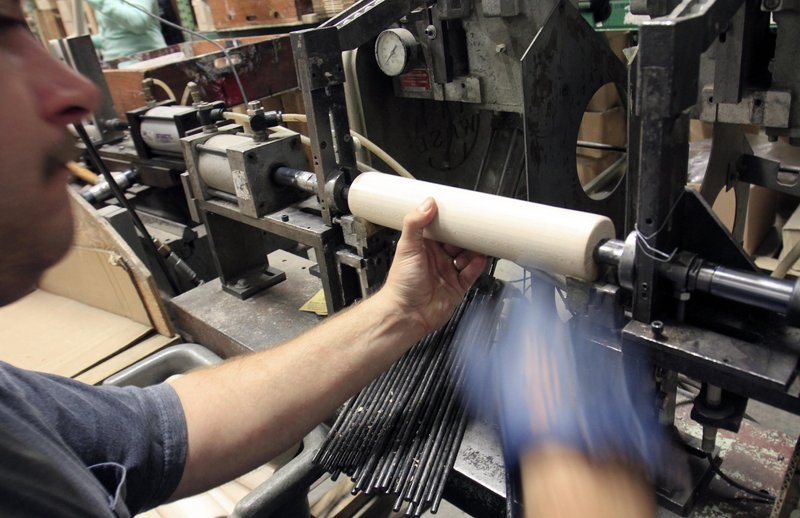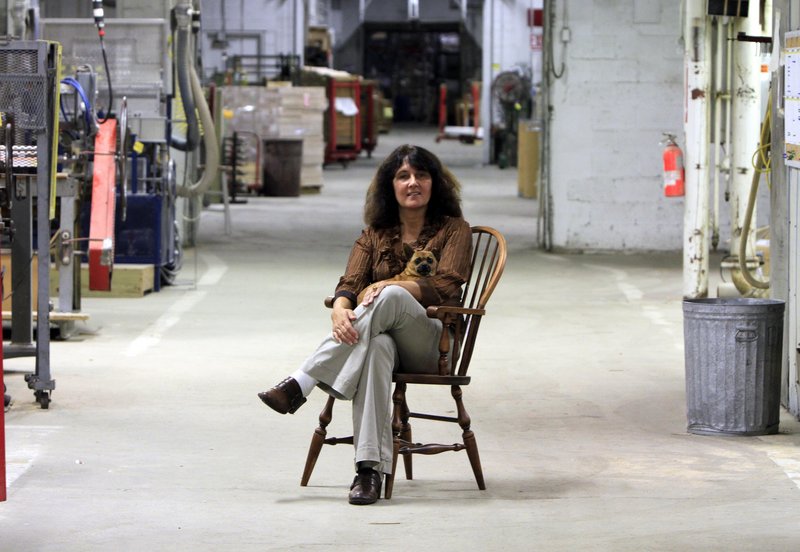GREENWOOD – Many people gave the Saunders Bros. manufacturing plant up for dead when it closed its doors and went to auction last spring, a victim of the sour economy and cheap imports flooding in from overseas.
Less than five months later, machines are humming and the smell of sawdust is in the air again as a skeleton crew puts out rolling pins, brush handles, dowels and other wood products.
Maine’s wood products industry has been on the slide for years. Numerous plants that made hundreds of everyday things — toothpicks, tongue depressors, Popsicle sticks, pepper mills, checkers pieces, clothespins, you name it — have gone out of business.
Now, a Portland woman and her partners have bought not only the shuttered Saunders Bros. factory, but three other plants as well in hardscrabble areas of interior Maine. Louise Jonaitis says she intends to bring the plants back to life in regions where times are tough and jobs are scarce.
“I grew up knowing a mill of any size was the life of a community in Maine,” said Jonaitis, 49, whose father worked in a paper mill when she was growing up in Rumford. “What I’ve been seeing as plants close is the decline of the social fabric in Maine. And I thought, ‘What else do we have?”‘
It’s no secret that rural Maine has suffered as its manufacturing base has eroded with its wood products plants, paper mills and other manufacturing facilities shutting down or cutting back.
Jonaitis and her partners paid about $1.8 million for the four plants, a fraction of their assessed value. Jonaitis has a financial backer, as well as business partners on two of the properties.
It pleases Philip Bibeau, executive director of the Wood Products Manufacturers Association in Westminster, Mass., to see some Maine plants being given a second life rather than being sold off piecemeal at auction. In Vermont, a former Stanley Tools mill in Pittsfield that shut down last year is reopening as The Original Vermont Wood Products Inc., with plans to manufacture saw handles and other wood products.
“If the economy starts to pick up a little, these people who have picked up these companies for a song will have some business,” Bibeau said.
Jonaitis, for years a social worker, seems like an unlikely savior of these mills. She got into the mining business in 2004, when she and other investors bought a gem mine in Newry where they found an unexpectedly large tourmaline deposit.
Last year, she turned to wood products plants after seeing one after another close over the years. Why, she asked, were they being shut down when Maine has such an ample wood supply and a plentiful work force?
In the past 17 months, she and her partners have bought an idled wood products plant and sawmill in Fryeburg, a former Ethan Allen furniture plant in Andover, the Greenwood mill and the Moosehead Furniture plant in Monson. The Andover, Greenwood and Monson plants were bought at auction.
She plans to slowly grow business at the Greenwood plant and have furniture-making under way by next spring in Monson. The Fryeburg facility, which will act as a sawmill to supply goods for her other plants, and the Andover plant, which will be used to dry and store wood, should be up and running late next year, she said.
Eight people are back on the payroll in Greenwood and others will soon be back at work in Monson. When things are going full steam, she hopes to have at least 60 employees between the two towns.
That’s small potatoes compared to the hundreds who used to work there, but at the least her efforts are keeping plants alive that otherwise would become a footnote in Maine’s long history of wood products manufacturing, said 50-year-old Fred Hamel as he worked a machine putting out thousands of small wooden dowels.
“I’m glad she’s buying them up to keep the products going in Maine,” Hamel said.
The trick now is to implement a profitable business model, she said.
With low debt from the acquisitions — she bought the Greenwood mill, including nearly $750,000 in inventory, for $450,000 — she’s willing to give it a go. The plant has scores of specialized wood-making machines — so many that Jonaitis doesn’t even know what half of them do.
For Moosehead Furniture, she’s developing a new business model.
Instead of selling to dozens of retailers around the country, she says she’ll open three Moosehead Furniture stores of her own — in Bar Harbor, Portland and Freeport — while also selling to one existing account, Stanley Furniture in Rumford.
She said she’ll strive to distinguish her products from imports, with no plans to go head-to-head with foreign manufacturers.
“I don’t see us competing with China,” she said. “We don’t even want to be in the battle with them.”
Robert Rice, a wood science and technology professor at the University of Maine, said the successful wood products plants around the state put out specialized products made with specialized equipment for niche markets.
“Those kinds of businesses do well. They don’t serve huge markets, but they serve sophisticated markets and buyers, and they look for the niche market,” he said.
At the Saunders Bros. plant, Scott Allen is happy — and somewhat surprised — to have a job again after the mill closed. He and a handful of others were back at work on a late September day, assembling rolling pins for an order of 10,000 for a company in Vermont. Workers will also be making products such as Foosball table handles, knife handles, honey dippers, duck calls and croquet mallets.
“I thought that was it,” Allen said of the day he heard the plant was closing. “Everything’s been folding and going overseas.”
And Rob and Linda Dupill, the owners of Stanley Furniture, are excited to see Moosehead Furniture make a comeback. Moosehead, founded in 1947, went under in 2007 before reopening later that year under a new ownership group. It shut down again last year, putting 125 people out of work.
With the Moosehead line no longer available, the Dupills bought foreign-made furniture to fill their showroom. But they’ve had problems with quality and deliveries.
“When I first heard Moosehead was going to reopen, at first I felt disbelief. But once it settled in — enthusiasm,” Rob Dupill said.
Send questions/comments to the editors.




Success. Please wait for the page to reload. If the page does not reload within 5 seconds, please refresh the page.
Enter your email and password to access comments.
Hi, to comment on stories you must . This profile is in addition to your subscription and website login.
Already have a commenting profile? .
Invalid username/password.
Please check your email to confirm and complete your registration.
Only subscribers are eligible to post comments. Please subscribe or login first for digital access. Here’s why.
Use the form below to reset your password. When you've submitted your account email, we will send an email with a reset code.